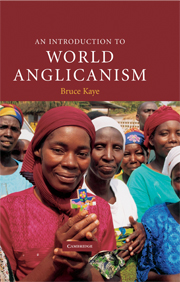Book contents
- Frontmatter
- Contents
- Acknowledgements
- List of abbreviations and sources
- Introduction
- PART I FOUNDATIONS
- PART II THE PRACTICES OF MISSION
- 4 Changing outlooks
- 5 Liturgical formation
- 6 Patterns of engagement – political
- 7 Patterns of engagement – relating to other traditions
- 8 Influence, organisation and power in the church
- 9 Ministerial offices – ordination
- 10 Ministerial offices – ordination of women
- 11 Ministerial offices – homosexuality and the public life of the church
- PART III BELIEFS
- Bibliography
- Index
6 - Patterns of engagement – political
Published online by Cambridge University Press: 05 June 2012
- Frontmatter
- Contents
- Acknowledgements
- List of abbreviations and sources
- Introduction
- PART I FOUNDATIONS
- PART II THE PRACTICES OF MISSION
- 4 Changing outlooks
- 5 Liturgical formation
- 6 Patterns of engagement – political
- 7 Patterns of engagement – relating to other traditions
- 8 Influence, organisation and power in the church
- 9 Ministerial offices – ordination
- 10 Ministerial offices – ordination of women
- 11 Ministerial offices – homosexuality and the public life of the church
- PART III BELIEFS
- Bibliography
- Index
Summary
Anglicans around the world live in very different political situations. Political engagement for Christians and the institutional church in Japan or Palestine or the Sudan means something very different from political engagement in New Zealand or Canada. How can Christians think they have a natural and accepted place in the world of politics in nations where another religion is either the religion of the state or is the majority and controlling religion in the society? How can a Christian in a committedly secular state sustain an engagement with that secularity in terms of their own religious faith? For the greater part of their history Anglicans have lived in a Christian country where such questions have not arisen and indeed could hardly have been formulated. It was just the most natural thing that the Christian ruler should have had the counsel of church leaders and that they should have exercised some power in the ordering of a Christian society.
Throughout their history Anglicans have experienced a wide variety of church–state relations and hence a variety of ways in which it has been possible to engage with the political process. The privilege of the Anglo-Saxon experience was very different from the experience of Tudor centralism. When Anglicans moved out of England they encountered different patterns of political life. Not surprisingly the republican instincts of the United States of America reacted against many of the monarchical and traditional elements which they had overthrown in their War of Independence.
- Type
- Chapter
- Information
- An Introduction to World Anglicanism , pp. 86 - 102Publisher: Cambridge University PressPrint publication year: 2005

